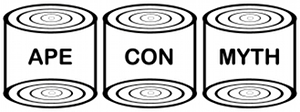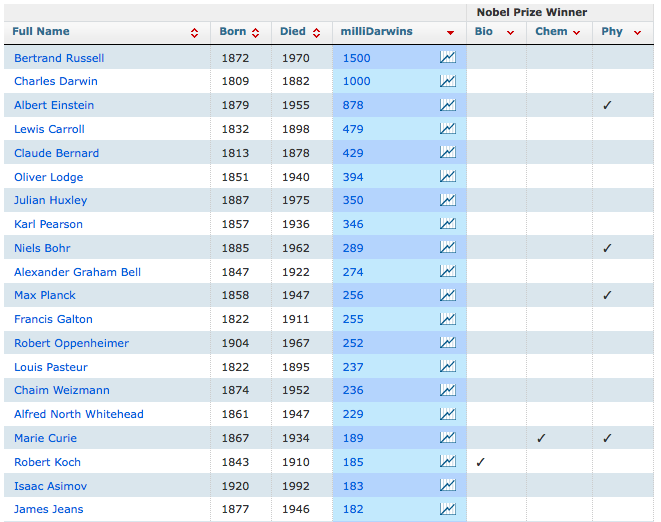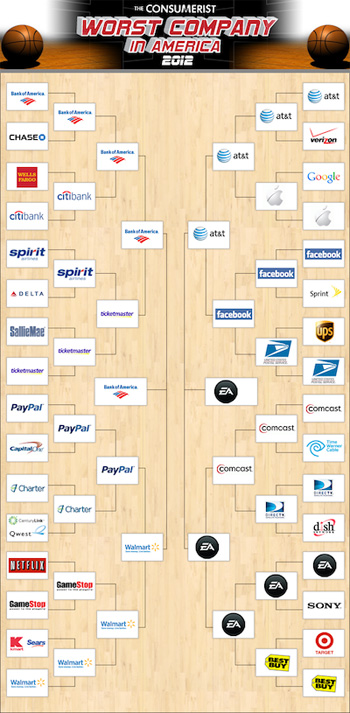Non-Profit People
Economics Devision
Internal Memo
April 6, 2012
If it’s okay for corporations to be called people, should it follow that people be allowed to seek non-profit status?
Profit-making has such a narrow band of activity associated with it that you couldn’t expect it to cover the entire range of productive human activity. Because whose definition of “productive” are we going to use? Is manufacturing Doritos productive?
There are over 1.5 million non-profits in the United States alone attempting to fill in the blanks and if you accept that artists are doing the same thing in a less tangible way you can add 2 more million to that number, not to mention all the volunteers and caregivers out there.
Too bad it’s the same problem. Non-profits need money too. There’s no way out, even if you’re not really playing the game.
How do we get out?
Famous Scientists for $1,000
Earlier this week we looked at the study of culturomics, which takes the frequency of a word’s use in written literature to quantify cultural trends. Now we’re going to see what can be done with this data on a larger scale, in this case, measuring the impact of scientists.
Here’s the top 20 from the Science Hall of Fame, which includes over 4,000 names from two centuries…
Though the researchers used milliDarwins as the measure of fame for the study, ACM’s favorite, Bertrand Russell tops the list.
To give you a little more perspective on the timelines involved here, check out this video that covers physicists, chemists and biologists and their level of fame by year. You’ll find plenty of new names worth looking into further…
Speaking of, who was Claude Bernard? Turns out he was a french physiologist who worked to bring the scientific method to medicine. First to use the term milieu intérieur (aka homeostatis), let’s close with a quote from him regarding our bodies’ relationship with the external world, which has some interesting relevance to the Ape Con Myth…
The living body, though it has need of the surrounding environment, is nevertheless relatively independent of it. This independence which the organism has of its external environment, derives from the fact that in the living being, the tissues are in fact withdrawn from direct external influences and are protected by a veritable internal environment which is constituted, in particular, by the fluids circulating in the body.
For more on the Science Hall of Fame, you can check out the article from Science explaining their process or go to Gonzo Labs for other materials from the study’s creators, John Bohannon and Adrian Veres.
The Best of the America’s Worst
The voting has ended over at The Consumerist and Electronic Arts has won the title of Worst Company in America for 2012.
Bank of America made it to the final match-up for a second year in a row, but failed to worst EA this year as it did with BP in 2011. The bracket brought together 32 of the least admired companies America has to offer and you can click on the image for the full bracket and blow-by-blow accounts of this year’s battle.
If you’d like to explore the history of the contest, here’s an archive of all the tournaments going back to The Consumerist’s start:
WCIA 2011 – BP beats Bank of America [bracket]
WCIA 2010 – Comcast beats Ticketmaster [bracket]
WCIA 2009 – AIG beats Comcast [bracket]
WCIA 2008 – Countrywide Home Loans beats Comcast [bracket]
WCIA 2007 – RIAA beats Halliburton [bracket]
WCIA 2006 – Halliburton beats ChoicePoint [bracket]
Notice all the repeats. Apparently “worst” doesn’t mean they won’t be around next year. But where else are you going to take your demand when the largest companies control almost all of the supply?
Watch Out For Falling Giants
Economics Devision
Internal Memo
April 3, 2012
Re: Watch Out for Falling Giants
Did anyone notice this line-up in the Econ Devision feed the other day?

That’s quite a few large companies looking vulnerable. Is the age of giants over and if so what might they be willing to do to keep from falling? Whose interest will it be in? How long can the inevitable be put off? Where’s the line between big business and bloated bully? Let’s keep our eyes out for more examples and any past highlights in the field of non-competitive overstaying of welcomes.
File under 00262 – The Behavior of Falling Giants
The Tiny Box Called Today
It’s one thing to live in the present and another to live without a sense of future and past. If there wasn’t so much going on today, that would be clear.
Culturomics attempts to make things clear by analysis of word usage from over five million books going back more than two centuries. Of all the words people have bothered to write down, how do the days of the week rate? That’s just one of many questions you can answer with Google’s Ngram Viewer.
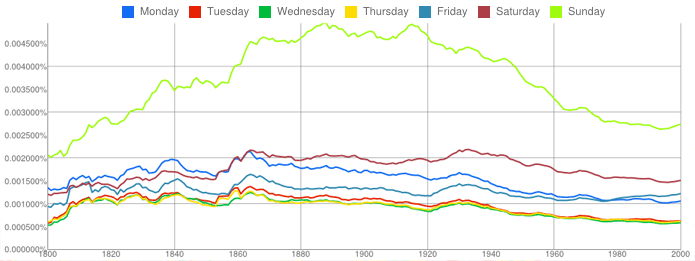
Try ‘ape, con, myth‘ and you find the story of the lowly ape witnessing the slow demise of the con and the rise of the myth.
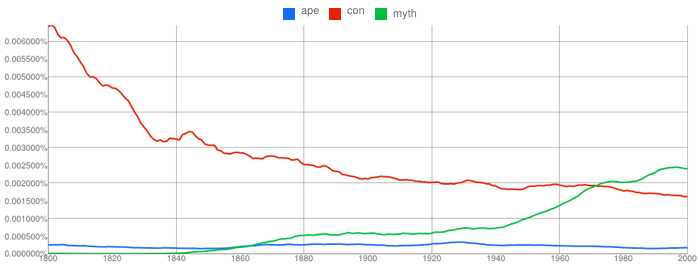
For something more down to Earth, you can found out who is playing second fiddle between ‘peanut butter, jelly’ and ‘beer, wine‘ or check out the historic temporal attitudes of prose writers with ‘yesterday, today, tomorrow‘…
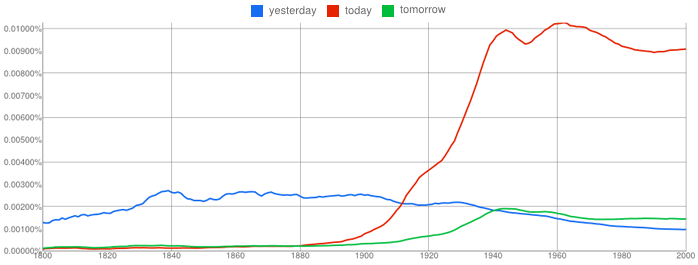
Turns out today wasn’t such a big deal in the 1800’s. … Nor was life expectancy.
If you come up with a good search, please share it in the comments.
Meet the Necessities
Food, clothing and shelter don’t really cover it anymore. It being the necessities, those things we cannot live without. For many people, survival has been boiled down to one thing. Actually, it’s two things, but we take one for granted such that it is rarely mentioned.
Death and Taxes might be inevitable, but to stay in the game you’ve got to have a combo more akin to Breath and Cash. Or, as better put in Ape Con Myth’s first blog post:
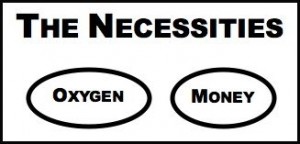
There’s the simplified version. Now let’s go the other direction with it…
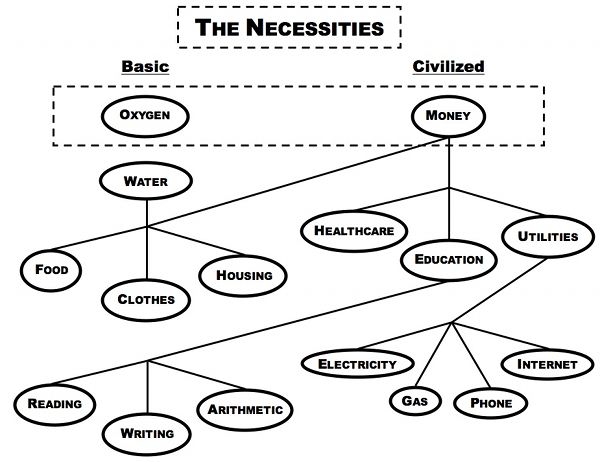
That’s more like it. Okay, it’s 2010 AD. Civilization has had a few thousand years. How are we doing in fulfilling these needs?
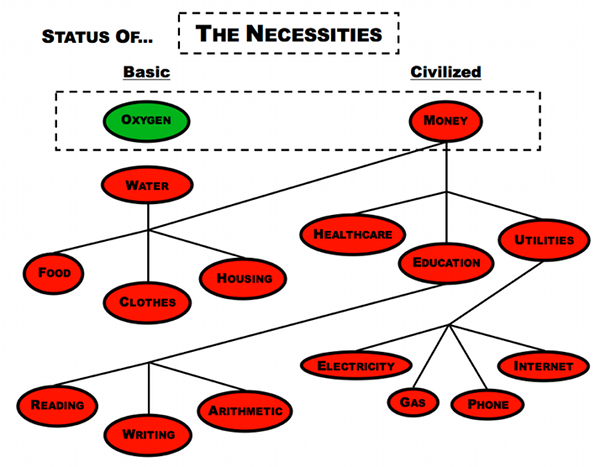
… We’ve got some work to do.
[Yes, we do. And now in 2012, with the Supreme Court considering the fate of one piece of this puzzle, Ape Con Myth’s live redesign is paving the way to take our study to the next level. How do we stop wasting our time struggling and find out what happens when we really dedicate some time to living?]The Biggest Group Of Friends The World Has Ever Seen
| Artist: M83 Song: Raconte-Moi Une Histoire Album: Hurry Up, We’re Dreaming
|
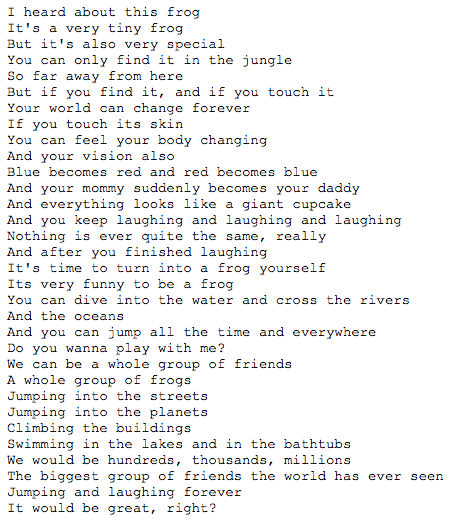 |
Living Outside of the Box
io9 put it best when they said, “Drop whatever you’re doing and watch this.”
That’s not a movie, it’s reality. In this case, the reality of a Solid Rocket Booster launching the Space Shuttle. But what about our reality? Why are the Solid Rocket Boosters having all the fun? Ask your representative that. Or even better, yourself.
Reality: It’s far more interesting than anyone is letting on.
We Now Pause for Station Identification
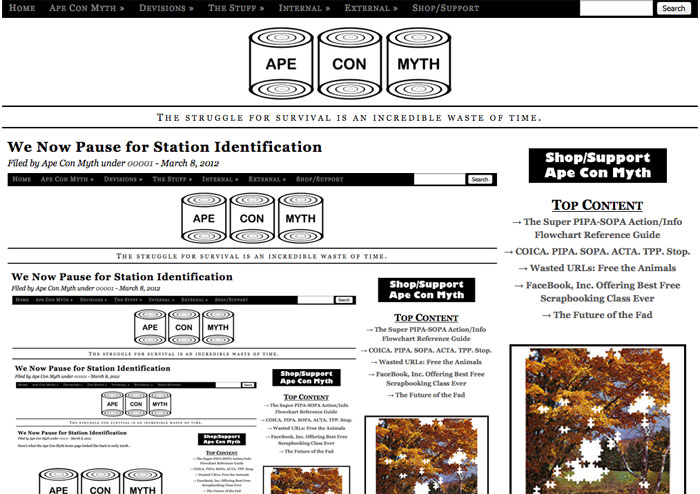
Here’s what the Ape Con Myth home page looked like back in early 2008…
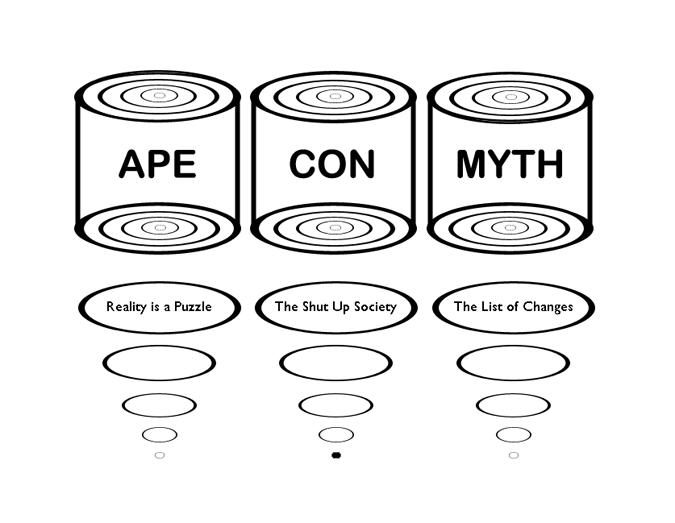
It started with a list of changes, a general vow to say as little as possible until more data could be studied and ACM’s first major project focused on sketching out the big idea of it all, Reality is a Puzzle.
Two years later, ACM expanded its operations, adding a blog to execute the same process from Reality is a Puzzle, this time with the world’s data being the puzzle pieces and the chalkboards representing ACM’s various efforts to put the pieces together.
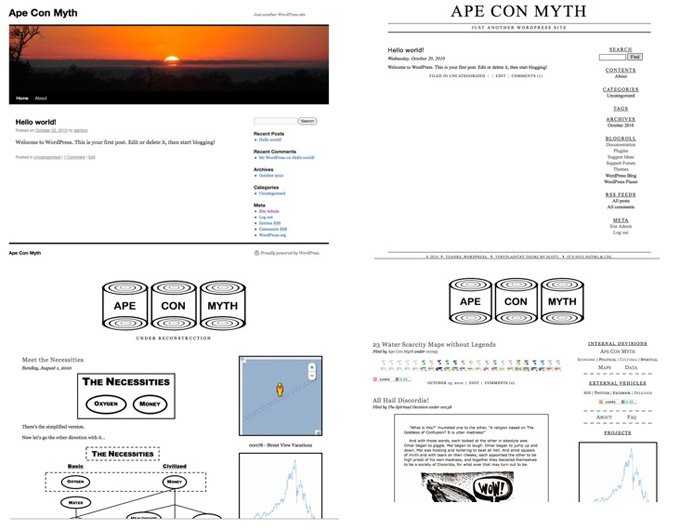
Now Ape Con Myth is on the verge of another expansion. Not only will ACM’s headquarters be relocating this month, but a live redesign will begin next week right here in front of your eyes.
The next time you see the site it won’t look like this.
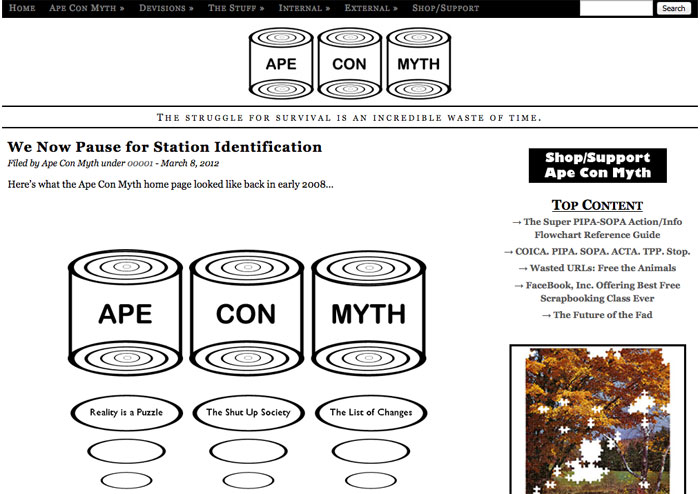
What happens next? Stay tuned to find out…
Everyone’s Doing It
Google’s new privacy policy kicked in this month and who really knows what we are supposed to be doing now…
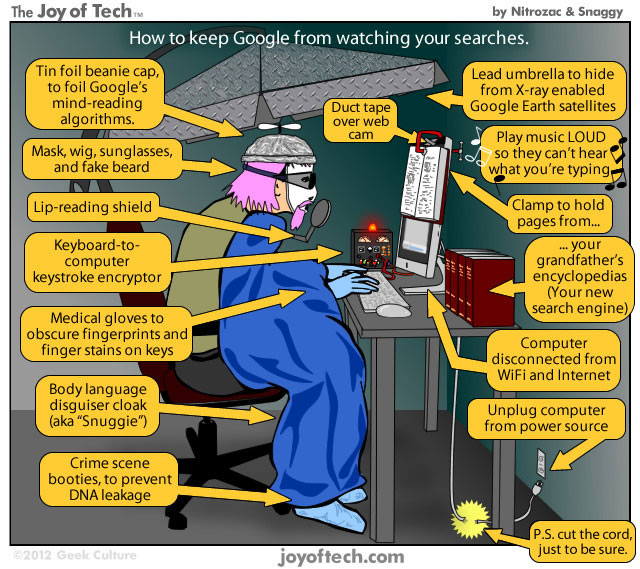
Everything above might be too much, but doing nothing probably isn’t enough. Even if we’re still just guessing at how this is going to come back to bite us. (Or perhaps we are all just sharing?)
The problem is these security and privacy issues require more time and thought than most people are giving to information they are actually interested in. The risks can seem far-fetched and the benefits are… overwhelming. As soon as number three on the list of Six Tips to Protect Your Search Privacy encourages you not to log into Google, … it just stops making sense. Who wants to face such a fundamental disconnect while they are trying to surf the web?!
[Joy of Tech via Pensador Louco on Diaspora]